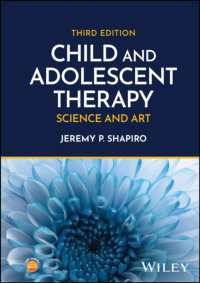- ホーム
- > 洋書
- > 英文書
- > History / World
Full Description
Absolute Beginners adopts a variety of approaches to study the Absolute as the ultimate source of knowledge in medieval philosophy. From a historical perspective, it examines a forerunner of Spinoza's departure from the Absolute in the Ethics: the doctrine of God as a first object in the generation of knowledge, as formulated by Henry of Ghent (†1293) and Richard Conington (†1330). Methodologically, it offers a case-study in the construction of an historical object, calling into question the self-evident and spontaneous way in which elements in the history of philosophy - its concepts and theories - are presented as primary givens. In a systematic sense, this study includes a reflection on structural indeterminacy, as pervading and stabilizing the differential system of exclusions which makes up the doctrine of God as a first object in the generation of knowledge.
Contents
ERSTER TEIL
Erster Abschnitt: Gott als Ersterkanntes in der Ordnung des Entstehens der Erkenntnis
Erstes Kapitel: Gewißheit, Immanenz und Aktualität
Kapitel 2: Einige Verschiebungen
Kapitel 3: Strukturale Unbestimmtheit
Zweiter Abschnitt: Der Raum der Gleichzeitigkeit
Erstes Kapitel: Die Konstruktion des gemeinsamen Raumes
Kapitel 2: Die zweite Frage des Quodlibets Johns of Reading
ZWEITER TEIL
Erster Abschnitt: Diesseits des Urteils - Die Lehre von Gott als Ersterkanntem bei Heinrich von Gent
Erstes Kapitel: Determinatio Augustini
Zweites Kapitel: Doppelgänger im Begriff
Drittes Kapitel: Gott als Ersterkanntes - der Fehler im Begriff
Viertes Kapitel: Erfahrung und Urteil
Fünftes Kapitel: Der konstitutive Ausschluß des Urteils
Zweiter Abschnitt: Jenseits der Intuition - Die Lehre von Gott als Ersterkanntem bei Richard Conington
Erstes Kapitel: Per viam sensus - Vom Vorstellungsbild zum washeitlichen Sein
Zweites Kapitel: Der kognitive Primat der intentio Deo propria
Drittes Kapitel: Streuung der Subjektivität
Viertes Kapitel: Der konstitutive Ausschluß der Intuition
Dritter Abschnitt: Schluß
Erstes Kapitel: Ausschluß und Unbestimmtheit - die strukturalen Merkmale der Lehre von Gott als Ersterkanntem
Zweites Kapitel: Die Immanenzebene
Appendices
Appendix 1: John of Reading, Quodl. q. 1 (Fragment)
Appendix 2: Richard Conington, Quaestio ordinaria 1
Literaturverzeichnis
Index
Summary
-

- 電子書籍
- 双極性障害のわたしが家族にしてほしかっ…
-

- DVD
- 大統領の理髪師






